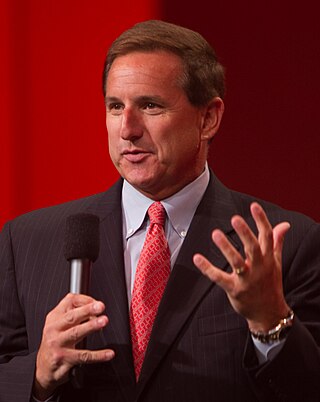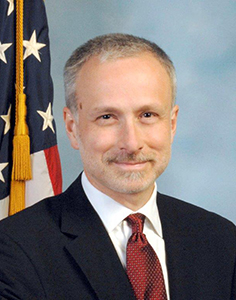
Theodore Bevry Olson is an American lawyer who served as the 42nd solicitor general of the United States from 2001 until 2004. Previously, Olson served as the United States Assistant Attorney General of the Office of Legal Counsel (1981–1984) under President Ronald Reagan. He remains a practicing attorney at the law firm of Gibson, Dunn & Crutcher.

PricewaterhouseCoopers International Limited is a multinational professional services brand of firms, operating as partnerships under the PwC brand. It is the second-largest professional services network in the world and is considered one of the Big Four accounting firms, along with Deloitte, EY, and KPMG.
Management consulting is the practice of providing consulting services to organizations to improve their performance or in any way to assist in achieving organizational objectives. Organizations may draw upon the services of management consultants for a number of reasons, including gaining external advice and accessing consultants' specialized expertise regarding concerns that call for additional oversight.

Thomas James Perkins was an American businessman and venture capitalist who was one of the founders of the venture capital firm Kleiner Perkins.

Viet D. Dinh is a Vietnamese-born American legal scholar who is on the board of Strategic Education. He is also the Chief Legal and Policy Officer of Fox Corporation where he leads all legal, government and regulatory and government affairs. He served as an Assistant Attorney General of the United States from 2001 to 2003, under the presidency of George W. Bush. Previously, Dinh was a partner at two leading law firms, Kirkland & Ellis LLP and Bancroft PLLC, the latter of which he founded. Born in Saigon, in former South Vietnam, he was a major contributor to the Patriot Act and is a former member of the Board of Directors of News Corporation.

In the context of information security, social engineering is the psychological manipulation of people into performing actions or divulging confidential information. A type of confidence trick for the purpose of information gathering, fraud, or system access, it differs from a traditional "con" in the sense that it is often one of the many steps in a more complex fraud scheme. It has also been defined as "any act that influences a person to take an action that may or may not be in their best interests."
Booz Allen Hamilton Holding Corporation is the parent of Booz Allen Hamilton Inc., an American government and military contractor, specializing in intelligence. It is headquartered in McLean, Virginia, in Greater Washington, D.C., with 80 other offices around the globe. The company's stated core business is to provide consulting, analysis and engineering services to public and private sector organizations and nonprofits.

Mark Vincent Hurd was an American technology executive who served as Co-CEO and as a member of the board of directors of Oracle Corporation. He had previously served as chairman, chief executive officer, and president of Hewlett-Packard, before his forced resignation in 2010. He was also on the board of directors of Globality and was a member of the Technology CEO Council and board of directors of News Corporation until 2010.
The Plame affair was a political scandal that revolved around journalist Robert Novak's public identification of Valerie Plame as a covert Central Intelligence Agency officer in 2003.
The CIA leak grand jury investigation was a federal inquiry "into the alleged unauthorized disclosure of a Central Intelligence Agency (CIA) employee's identity", a possible violation of criminal statutes, including the Intelligence Identities Protection Act of 1982, and Title 18, United States Code, Section 793.

James Andrew Baker is a former American government official at the Department of Justice who served as general counsel for the Federal Bureau of Investigation (FBI) and later served as deputy general counsel at Twitter, Inc. before being fired by Elon Musk in December 2022.
Commercial intelligence is a form of open-source intelligence practiced by diverse international and local businesses.
Patricia C. Dunn was the non-executive chairman of the board of Hewlett-Packard (HP) from February 2005 until September 22, 2006, when she resigned her position.

George Albert "Jay" Keyworth II was an American physicist who served as White House Science Advisor from 1981 to January 1986. He was a board member of Hewlett-Packard who was asked to step down in light of the controversy surrounding disclosure of sensitive information to the media. He resigned on September 13, 2006.
Ann O'Neil Baskins is former General Counsel for Hewlett-Packard Company (HP). Baskins was linked to the HP pretexting scandal. On September 28, 2006, following public disclosure of the matter, Baskins resigned effective immediately, hours before she was to appear as a witness before the House Committee on Energy and Commerce at which she would later invoke the Fifth Amendment to "not be held to answer for a capital, or otherwise infamous crime." Baskins was never charged by California or federal authorities.
Larry Sonsini is an American lawyer specializing all aspects of corporate law. He is senior partner and founder of Wilson Sonsini Goodrich & Rosati, an international law firm in business and intellectual property law. In 2021, Sonsini was chosen to serve as chair of the board of trustees at Santa Clara University.

The Hewlett-Packard Company, commonly shortened to Hewlett-Packard or HP, was an American multinational information technology company headquartered in Palo Alto, California. HP developed and provided a wide variety of hardware components, as well as software and related services to consumers, small and medium-sized businesses (SMBs), and large enterprises, including customers in the government, health, and education sectors. The company was founded in a one-car garage in Palo Alto by Bill Hewlett and David Packard in 1939, and initially produced a line of electronic test and measurement equipment. The HP Garage at 367 Addison Avenue is now designated an official California Historical Landmark, and is marked with a plaque calling it the "Birthplace of 'Silicon Valley'".

The practice of mass surveillance in the United States dates back to wartime monitoring and censorship of international communications from, to, or which passed through the United States. After the First and Second World Wars, mass surveillance continued throughout the Cold War period, via programs such as the Black Chamber and Project SHAMROCK. The formation and growth of federal law-enforcement and intelligence agencies such as the FBI, CIA, and NSA institutionalized surveillance used to also silence political dissent, as evidenced by COINTELPRO projects which targeted various organizations and individuals. During the Civil Rights Movement era, many individuals put under surveillance orders were first labelled as integrationists, then deemed subversive, and sometimes suspected to be supportive of the communist model of the United States' rival at the time, the Soviet Union. Other targeted individuals and groups included Native American activists, African American and Chicano liberation movement activists, and anti-war protesters.

The Robert Mueller special counsel investigation was an investigation into 45th U.S. president Donald Trump regarding Russian interference in the 2016 United States elections and was conducted by special prosecutor Robert Mueller from May 2017 to March 2019. It was also called the Russia investigation, Mueller probe, and Mueller investigation. The investigation focused on three points:
- Russian interference in the 2016 United States elections
- Trump associates and their connection to Russian officials and espionage
- Possible obstruction of justice by Trump and his associates

The United States Department of Justice under the Trump administration acquired by a February 2018 subpoena the Apple iCloud metadata of two Democrats on the House Intelligence Committee, several others associated with the committee, and some of their family members. The subpoena covered 73 phone numbers and 36 email addresses since the inception of the accounts. Seizing communications information of members of Congress is extraordinarily rare. The department also subpoenaed and obtained 2017 and 2018 phone log and email metadata from news reporters for CNN, The Washington Post and The New York Times. Apple also received and complied with February 2018 subpoenas for the iCloud accounts of White House counsel Don McGahn and his wife. Microsoft received a subpoena relating to a personal email account of a congressional staff member in 2017.













